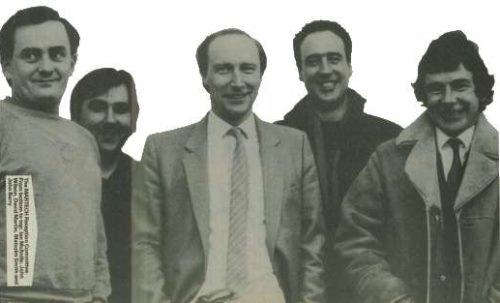
The MARTECH Reception Committee. From left to right: Ian McArdle, John Wilson, David Martin, Malcolm Smith and John Barry.
Martech is one of the original home computer software houses — they were around right at the beginning of this wondrous industry. Graeme Kidd took a (long) trip down to the south coast, just by Eastbourne, to meet the men from Martech.
A couple of years ago, people stopped calling David Martin ‘Sir’.
Not that he was unfrocked as a knight of the realm — he stopped being a chemistry teacher (called ‘Sir’ during the day) and part time software house boss, becoming an ex chemistry teacher and full time software publisher.
David has always had a keen interest in games; before the ZX80, he was teaching chemistry by day and designing board games in his spare time, with some commercial success. David’s brother-in-law, John Barry, got used to visiting the Martin household, finding counters and half-designed boardgames covering the carpet in the front room. The board game business began to build up, and although John ‘hates’ board games, he got involved commercially with the young company founded by David.
“It was and still is very useful to have John as a partner,” David explains, “and not just because he’s a solicitor! In the early days John’s legal experience was invaluable, especially when Software Communications Ltd was first set up in partnership with a firm of exporters.” Software Communications has been trading as Martech for quite a while now, and the exporting partnership has expired, but John’s legal experience is still very useful when it comes to dealing with licensing agreements and so on.

The MARTECH Reception Committee. From left to right: Ian McArdle, John Wilson, David Martin, Malcolm Smith and John Barry.
While he was a teacher, David’s interest in games moved him to experiment with the school’s computer equipment, and he began writing games. As soon as the ZX computers arrived, he began programming games at home. Gradually a hobby turned into a cottage industry and Martech games began to expand. “It was an amazing period,” David recalls, “I can still remember getting a 16K RAM pack — I couldn’t believe the memory”. To begin with, duplication and despatch of Martech games was all done at home, in evenings and weekends. “We got to the point where we were manufacturing all weekend, and one day, having just manufactured ten games in a morning and just received a large order for WH Smiths, we realised we were going to have to sub-contract.”
The level of activity at the fledgeling Martech Games began escalating and soon it was decision time for David: should he give up a secure teaching post for a full time career in the software industry? “It was a very daunting decision to make at the time,” David says, “when you’re a teacher you get used to being ‘securely broke’, and the risk element was a major consideration. I realised I would have to abandon a secure job to carry on with software sensibly, and I’ve never regretted making that decision at all.”
To begin with, David’s boardgaming ideas were pressed into service — he saw the potential of using computers to moderate boardgames. Conflict and Galaxy Conflict for the Spectrum, Commodore 64 and BBC machine were followed by Quest of Marravid on the C64 and Vic 20 and Gisburn’s Castle for the BBC. “I soon realised that computer moderated board-games were expensive to produce and they weren’t really designed with manufacture in mind. One game, for instance, had 140 counters — and they all took up a disproportionate amount of shelf space in the shops. I came to the conclusion that boardgames involving computers weren’t viable unless you were a large company with lots of expertise in producing traditional boardgames.”
Martech changed direction, becoming involved with ‘personality’ games. “It didn’t take long for me to work out that my programming talents were limited,” David admits, “and the time I had available to learn programming was limited by my involvement with the commercial side of running a business.” It was time to hire in some programming talent.
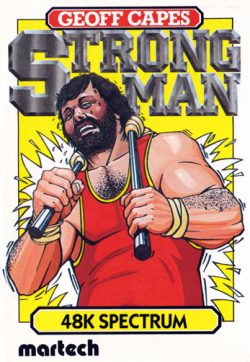
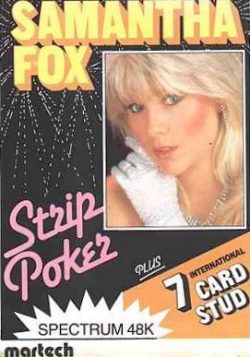
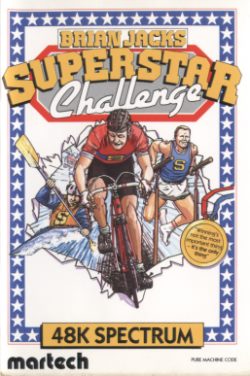
Ian McArdle has been with Martech, right from the start of the personality games stage of the company’s life. He wrote Eddie Kidd’s Jump Challenge, and is currently part of the team working on The Planets — but more of that anon. Martech’s games have consistently involved licences or personalities: Eddie Kidd, Brian Jacks, Geoff Capes, Zoids and now Sam Fox, and The Planets (a TV series and book).
“Obviously, a licence helps with marketing,” David states, “but we find that a licence often helps to prompt or develop a game idea. Personally I like simulation games, and it’s great to have someone involved who can provide accurate facts and figures which can be incorporated in the game. Our first licence game, Eddie Kidd’s Jump Challenge came about because we were looking for an exciting personality to endorse a motorbike game. Eddie is the world record holder for motorbike jumps, and we approached him, signed a licensing deal and then developed the game with his help.”
Brian Jacks Superstar Challenge was Martech’s Decathlon-type game, followed by a rather different athletic game — the icon driven Geoff Capes Strongman. Zoids, the computer game was born one Saturday afternoon, in the front room of the Martin household. David had come back from a shopping expedition, having bought some toys and was on the carpet with his youngsters assembling and playing with a couple of Zoids. “They were great — on the Monday I got in touch with Tomy who make Zoids, and eventually a deal was tied up.” The Electronic Pencil Company were hired to produce the game.
Martech’s way of working has evolved into a team-based approach to writing games. So far, all the games released by Martech have been in-house projects: “We’re more interested in overseeing the development of the whole concept, from the original lightbulb of an idea in someone’s head to the shelves of High Street stores. We’ve never marketed anything sent to us — but we’ve found some very good programmers that way!”
David Martin feels that the days when one programmer can produce an entire game from start to finish are over. Sure, there will still be room for a few Mike Oldfields in the software industry — people to design the game, implement the graphics, write the code and provide copy for the inlay. But people like Steve Crow (of Starquake fame, amongst other things) are very rare indeed. Most software houses need to pull in specialists to take care of the different aspects of writing a program. “We’re putting a lot more effort into our games nowadays,” David says, “we partition the task and use specialists who work together on a project in a team.”
Martech employs full-time programmers, preferring not to rely on freelances. At present there are two teams of half a dozen or so programmers, one group based in Brighton and the other working in Portsmouth. A third team is being set up in order to cope with the schedule planned releases — Martech has decided to release programs two at a time, rather than singly, and ten games are planned for 1986.
Martech’s administrative offices are located in Pevensey Bay, (above John’s Legal Practice — very handy having a solicitor downstairs!) — fairly centrally as far as the programming teams are concerned. While most of the work is done at programmers’ homes, teams meet up in the main office from time to time to bounce ideas around, show David how things are going and talk code and routines as programmers invariably do.
Three members of the Brighton team were at Martech HQ on the day of the CRASH visit: programmers Ian McArdle and John Wilson and graphics man, Malcolm Smith. Ian has been with Martech since David gave up programming and has worked on a variety of projects; John Wilson’s pedigree includes the contract for Century’s Their Finest Hour and the Spectrum conversion of Geoff Capes Strongman. Malcolm has been on the Martech staff for about a year now, coming from Brighton Art College to design screen graphics as required by programmers. His credit list includes work on the Amstrad versions of Brian Jacks and Zoids as well as Geoff Capes and The Planets for the Spectrum and Amstrad. Oh, and he was the man who digitised Samantha Fox’s charms for the Spectrum screen...
The Brighton team are putting the finishing touches to The Planets, a game based on accurate data on the solar system supplied by Heather Cooper, Astrophysicist, Author, TV presenter and Big Cheese in the Astronomy world. “The Planets game is an example of the way projects we want to do evolve with a licence agreement,” David explains, “in a sense we were looking for a space game and then found the licensing angle. Working with Heather, who presents Channel 4’s series The Planets, we have been able to incorporate a vast quantity of up to the minute data on the planets in the solar system into the game.” While the game is first and foremost intended to be fun, the wealth of information it contains means that some of it is bound to rub off on the player, who should end up with a greater knowledge of the planetary system in which we live. Education the fun way...
The story behind the development of The Planets provides a fairly typical example of the evolution of a Martech game. David Martin is the main ideas man in the company: “Ideas for the next game are constantly in your mind — some are dismissed while others are modified. Gradually an outline skeleton of a game concept passes more and more hurdles until it finally comes together as a concept. We don’t tend to do much formally — most games evolve in the writing. We don’t sit down and come up with a definitive storyboard and then say to the programming team ‘implement that’.”
The scenario for The Planets evolved over three months or more. Starting with the basic idea of doing a space game, Martech approached Heather Cooper and secured her involvement in the project. Malcolm began studying Heather’s book, The Planets, as well as NASA photographs and the graphics for the game took shape, based on the book, TV series — and imagination! One of the Portsmouth programming team had written the basis of a rather strange but very compelling 43 level puzzle/strategy game. This game was modified a little and incorporated in the scenario of The Planets as The Alien Game which has to be played in order to obtain clues useful during the interplanetary section of the main game.
The Planets will be Martech’s third release this year. Martech’s 1986 began with Zoids, and continued with Sam Fox Strip Poker. The Sam Fox game has already caused a bit of a storm in a D cup: one computer magazine refused to carry Martech’s advertising and, while asking for a review copy, stated that they would only review the B side of the tape where a four-handed fully clothed Stud Poker game resides. The poker game behind Sam Fox is a very nifty piece of programming, and had had been on Martech’s shelves for a while before the tie-in with Samantha Fox was mooted. “The Sam Fox element is not to be taken seriously,” David explains, “it’s just meant as a bit of fun. When you play poker for real, you play for money but that’s a bit difficult with a computer. The Sam Fox tie-in gives an incentive, if you like, adding that bit of adrenalin to the game. Naturally the licence will help us sell the program, and so far the order levels are very respectable.”
Sexist or not, at least Sam Fox’s digitised form makes a change from the usual run of Gore and Violence. A star character taking off a few items of clothing seems less harmful to this reviewer, than the mindless violence perpetrated by such dudes as Jason in Friday 13th and Rambo in his jungle game.
Martech’s history is one of steady and cautious growth — each subsequent release builds upon a solid base as the company expands. While the programmers concentrate on the three main machines, Spectrum, Amstrad and Commodore, all Martech’s games are converted for the Acorn computers and MSX, giving their products a long shelf life overall.
David Martin is pleased with the way things are going for his company at the moment — and there is little doubt that the quality of Martech releases is steadily improving. If anything, Zoids was too good! Some interesting projects are in the pipeline from Martech but it’s a little too early to reveal details as yet.
Martech has been around for a long time, and look set to be around a lot longer: “We’re working towards producing better and better software,” David says, “we do like games for their own sake. The games market, not just on computers, has always been in existence, and as long as there are computers in homes we intend to continue writing games for them.”
And no doubt, they will.
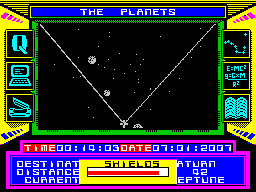
You have been chosen to save the human race by finding eight alien capsules and decoding the message they contain.
Zooming through space on your mission to find the eight capsules that have been placed in space, one on each planet in the solar system, your main viewscreen shows the action as you fight your way through asteroid belts and meteor storms.
Damage control indicates the number of hits your craft has taken so far on the journey to Saturn. Once you’ve played the Alien Game, loaded in separately, and got a few clues on how to go about opening the capsules on the planets, it’s time to go; select the space travel icon and zoom into space.
The three icon windows to the right of the main viewscreen access the onboard computer’s information banks, from which you can call up maps and planetary data.
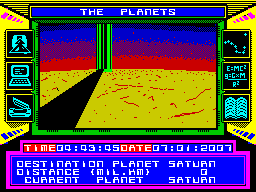
Wahey, Hey! You’ve found the capsule hidden on Saturn’s surface. Did you get far enough in the ALIEN GAME to get the appropriate clue? If you did, the capsule can be opened and another part of the solution to Earth’s problems can be collected. The Aliens who left the capsules behind and beamed their game down to Earth in the middle of a major crisis must have a strange sense of humour. Why couldn’t they just send a Telemessage?
The Main part of the PLANETS game loads your ship into the 48K Spectrum with data for Mercury, Venus and Earth. Further loads are needed before you can explore further afield in the solar system, with two or three planets contained in each sub program. 128 owners get it all in one.
As you make progress in the game, you’ll find your capabilities are extended! Crack the code first, tell Martech and there’s a neat telescope on offer, it seems.
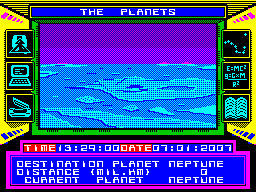
A safe landing has been achieved, and landing gear down, your ship is on the surface of Neptune. Once the spacecraft is in orbit around a planet, selecting the appropriate icon calls up a targetting grid and the aim of the game is to land next to the capsule left on that planet by the aliens. Fuel is limited, and careful control is needed to make a safe landing, taking into account the local gravity and atmosphere. Use too much fuel in the descent, and you’ll never see home again!
The three icon windows on the left allow you to examine a capsule when you come across one, engage the computer systems during landing and travel, and call up details of the local terrain and conditions while capsule hunting.